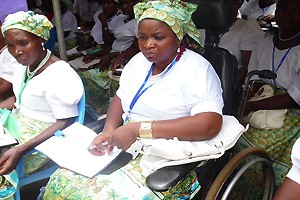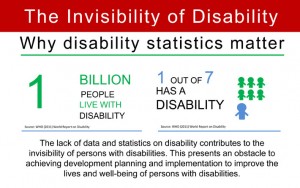The lack of data and information on disability and the situation of persons with disabilities at the national level contributes to the invisibility of persons with disabilities in official statistics, presenting an obstacle to achieving development planning and implementation that is inclusive of persons with disabilities.
The UN General Assembly has stressed in several resolutions the importance of improving disability data and statistics. In particular, to be internationally comparable, data should be collected in line with international standards. The Washington Group on Disability Statistics, a group which operated under the aegis of the UN Statistical Commission, has developed an internationally comparable set of questions for census and surveys. Data collected with these questions will be useful to assist the monitoring of development goals for persons with disabilities.
- Expert Meetings on Monitoring and Evaluation for Disability-inclusive Development
- Side-event at the 47th session of the UN Statistical Commission: "Disability statistics and measurement: National experiences and opportunities for the 2030 Agenda for Sustainable Development", 10 March 2016
- Report of the Inter-agency and Expert Group on Sustainable Development Goal Indicators (E/CN.3/2016/2, 17 December 2015)
- References to disability in the Summary of comments released by the IAEG-SDGs
- Global Network on Monitoring and Evaluation for Disability-inclusive Development
- Changing the game for persons with disabilities in global development planning
Disability indicators for the SDG Framework
The UN Secretariat for the Convention on the Rights of Persons with Disabilities, with contributions and support from the World Health Organization, has prepared a technical note in consultation with experts from international agencies and from disability organizations. This note has been submitted to the IAEG-SDGs.
Disability references in the Sustainable Development Goals (SDGs) indicators (agreed upon by the UN Statistical Commission in March 2016)
Current guidelines to collect disability data
Washington Group questions for surveys and censuses
In 2014, the UN Statistics Commission acknowledged the accomplishments of the Washington Group on Disability Statistics. These accomplishments include a set of six questions which can be included in national censuses and surveys to collect data on persons with disabilities.
- Washington Group on Disability Statistics, Jennifer H. Madans, National Center for Health Statistics/Washington Group on Disability Statistics
Recommendations for censuses
On 10 June 2015, the United Nations Economic and Social Council adopted a resolution entitled “2020 World Population and Housing Census Programme” (E/CN.3/2015/6). This resolution stresses that population and housing censuses are designed to generate valuable statistics and indicators for assessing the situations of persons with disabilities. The latest recommendations to collect data on persons with disabilities in censuses are presented in the Principle & Recommendations for Population and Housing Censuses (Rev 2), p.178.
Worldwide use of Washington Group questions
Data gathered through the Washington Group questions in censuses and surveys will be useful to monitor the SDGs on education and employment which include targets for children and persons with disabilities.
The following countries/territories have included Washington Group questions in their last census:
Albania (2011), American Samoa (2010), Aruba (2010), Belize (2010), Brazil (2010), Democratic People's Republic of Korea (2008), Guam (2010), Indonesia (2010), Israel (2008), Italy (2012), Jamaica (2010), Marshal Island (2011), Mauritius (2011), Micronesia (2010), Nauru (2011), Northern Mariana Islands (2010), Qatar (2010), Romania (2011), Saint Lucia (2010), Senegal (2013), Serbia (2011), Solomon Islands (2009), South Africa (2011), Sri Lanka (2012), State of Palestine (2007), Timor-Leste (2010), Tonga (2009), Trinidad and Tobago (2011), Turkey (2011), United States of America (2010), United States Virgin Islands (2010), Vanuatu (2009), and Viet Nam (2009).
Source: UN Statistics Division and Secretariat for the Convention on the Rights of Persons with Disabilities. Updates to this list can be sent to: martinho@un.org
Collecting data on children with disabilities
UNICEF and the Washington Group on Disability Statistics are currently developing a set of questions to collect data on children with disabilities in surveys.
- Measuring child disability: Updates on the work of UNICEF and the WG, Claudia Cappa, Data and Analytics Section, UNICEF, New York
- Strengthening statistics on children with disabilities: UNICEF's work and planned activities (UNICEF)
- WG/UNICEF Survey Module on Child Functioning and Disability, Mitchell Loeb, National Center for Health Statistics/Washington Group on Disability Statistics in collaboration with UNICEF
Past meetings on disability data, statistics, monitoring and evaluation
- Expert Meeting on Monitoring and Evaluation for Disability-inclusive Development, 10-11 May 2017, ILO Headquarters, Geneva, Switzerland
- Regional Meeting on Disability Measurement and Statistics in support of the 2030 Agenda for Sustainable Development and the 2020 World Population and Housing Census Programme (26-28 July, Bangkok, Thailand), organized by the UN Statistics Division, in collaboration with the UN Economic Commission for Asia and the Pacific (ESCAP). The meeting will review and discuss national experiences in approaches taken to measure the population with disabilities during national censuses of the 2010 round; discuss strategies for compilation of data on disability for monitoring of SDGs; and share national experiences among participating countries and foster intra-regional cooperation aimed at enhancing national capacity in disability measurement and improving the quality of data for monitoring of the SDGs.
- UN Expert Group Meeting on Disability Data and Statistics, Monitoring and Evaluation: The way forward, a disability inclusive development agenda towards 2015 and beyond, 8-10 July 2014, UNESCO Headquarters, Paris
- Interactive panel discussion on “The Informal Network on Disability Statistics for Inclusive Development" at the 45th Session of the Statistical Commission, 4 March 2014, UN Headquarters, New York
- Interactive panel discussion on “Disability data and statistics for inclusive development: next steps for action at global, regional and national levels" at the 43rd Session of the Statistical Commission, 1 March 2012, UN Headquarters, New York
- Panel Discussion: Towards inclusive development: improving data and statistics on disability, 2 December 2011, UN Headquarters, New York
- Workshop on Disability Statistics in the ESCWA Region, 21-23 March 2005, Beirut, Lebanon
- Report of the Meeting on Disability Measurement for ESCWA Countries, 1-5 June 2002, Cairo, Egypt
- UN Expert Group Meeting on Disability-sensitive Policy and Programme Monitoring and Evaluation. See Discussion Paper and Report of the meeting, 3-5 December 2001, UN Headquarters, New York
- International Seminar on Measurement of Disability, 4-6 June 2001, New York Helmsley Hotel, New York
UN resolutions on disability monitoring and evaluation, data and statistics
- ECOSOC resolution “2020 World Population and Housing Census Programme” E/CN.3/2015/6
This resolution by the UN Economic and Social Council (ECOSOC) stresses that population and housing censuses are designed to generate valuable statistics and indicators for assessing the situations of persons with disabilities. - General Assembly Resolution A/RES/65/186
Resolution 65/186 calls upon Governments to strengthen the collection and compilation of national data and information about the situation of persons with disabilities following existing guidelines on disability statistics that are disaggregated by sex and age, which could be used by Governments to enable their development policy planning, monitoring, evaluation and implementation to be disability sensitive, in particular in the realization of the Millennium Development Goals for persons with disabilities, and invites Governments to provide, where available, relevant data and statistics to the appropriate mechanisms within the United Nations system, including the Statistical Commission. - General Assembly Resolution A/RES/64/131
In this resolution, the General Assembly calls on Governments to build a knowledge base of data and information about the situation of persons with disabilities, which could be used to facilitate disability-sensitive development policy planning, monitoring, evaluation and implementation. Particular attention is paid to the realization of the Millennium Development Goals for persons with disabilities, and in this regard the Assembly:
(a) Requests the Secretary-General to disseminate widely and promote the use of theGuidelines and Principles for the Development of Disability Statistics and the Principles and Recommendations for Population and Housing Censuses and to facilitate technical assistance, within existing resources, including the provision of assistance for capacity-building of Member States, in particular to developing countries.
(b) Encourages Member States to make use of statistics, to the extent possible, to integrate a disability perspective in reviewing their progress towards realizing the Millennium Development Goals for all. - General Assembly Resolution A/RES/63/150
This resolution requests the Secretary-General to give higher priority to the concerns of, and issues related to, persons with disabilities, as well as their inclusion within the work programme of the United Nations system in order to ensure that the 2010 World Programme on Population and Housing Censuses is inclusive of the perspective of persons with disabilities.
Key publications
- A World That Counts: Mobilising The Data Revolution for Sustainable Development, by the Secretary-General’s Independent Expert Advisory Group on a Data Revolution for Sustainable Development. The report pointed out the lack of data on persons with disabilities and recommended disaggregation of data by disability. November, 2014
- Disability at a Glance 2012: Strengthening the Evidence base in Asia and the Pacific, UN ESCAP
- World Report on Disability, WHO and the World Bank, 2011
- Strategic Action towards Inclusive Development: Disability, Human Rights and Statistics, UN Department of Economic and Social Affairs (DESA), 2010
- Statistics on the employment situation of people with disabilities: A Compendium of national methodologies, Working Paper No. 40, ILO Bureau of Statistics in collaboration with the InFocus Programme on Skills, Knowledge and Employability Policy Integration Department Bureau of Statistics, International Labour Office, Geneva, April 2004
Key websites
- Repository of Disability Surveys and Census, compiled by World Health Organisation (WHO)
- Data & Statistics on Disability, World Bank
- Human functioning and disability, UN Statistics Division, DESA
- United Nations Disability Database (DISTAT)
Other resources
- Demographic Yearbook Questionnaire on Human Functioning and Disability Statistics (2006 version, English only) , UN Statistics Division, DESA
 Welcome to the United Nations
Welcome to the United Nations

